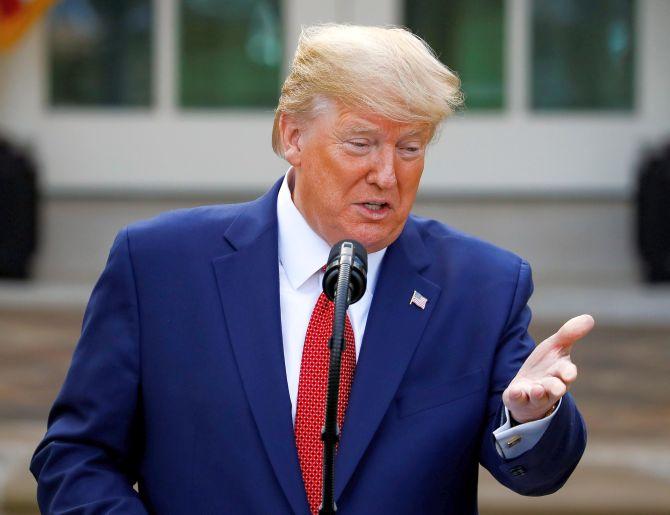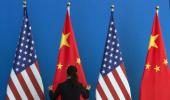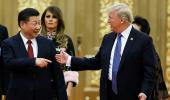The United States does not rule out the possibility of closing more Chinese diplomatic missions in the country, Donald Trump has said, hours after Washington ordered the closure of Beijing's consulate in Houston to "protect American intellectual property and private information".

The US move came amid a growing number of disputes between the two countries over Beijing's increasingly aggressive actions that have led Washington to take strong actions, including closing the consulate in Houston, according to senior Trump administration officials.
The consulate in Houston, Texas, is one of five Chinese diplomatic missions in the US, not counting the embassy in Washington, DC.
The US move came after the Justice Department said that hackers working with the Chinese government targeted firms developing vaccines for the coronavirus and stole hundreds of millions of dollars worth of intellectual property and trade secrets from companies across the world.
"As far as closing additional embassies, it's always possible," Trump told reporters during a daily press briefing at the White House when asked if he is looking at closing more Chinese diplomatic missions in the US.
The US State Department in a brief statement on Wednesday said it has "directed the closure of People's Republic of China Consulate General Houston, in order to protect American intellectual property and American's private information".
State Department spokeswoman Morgan Ortagus said the US will not tolerate the PRC's violations of its sovereignty and intimidation of its people, just as it has not tolerated the PRC's unfair trade practices, theft of American jobs, and other egregious behaviour.
She said Trump "insists on fairness and reciprocity in US-China relations."
During the press conference, Trump referred to the news reports of fire in the Chinese Consulate in Houston apparently due to burning of documents in its courtyard.
"You see what's going on. We thought there was a fire in the one that we did close. And everybody said, 'There's a fire. There's a fire.' And I guess they were burning documents or burning papers, and I wonder what that's all about," he said.
Meanwhile, testifying before the Senate Foreign Relations Committee on Wednesday, Deputy Secretary of State Stephen Biegun gave a context to the decision to close the Houston consulate.
"We find the US-China relationship today weighed down by a growing number of disputes, including commercial espionage and intellectual property theft from American companies; unequal treatment of our diplomats, businesses, NGOs, and journalists by Chinese authorities; and abuse of the US academic freedom and welcoming posture toward international students to steal sensitive technology and research from our universities in order to advance the PRC's military," he said.
"It is these factors which led the president to direct a number of actions in response, including yesterday's notification to the PRC that we have withdrawn our consent for the PRC to operate its consulate in Houston, Texas," Biegun said.
The move to shutdown the Chinese consulate in Houston was welcomed by top American lawmakers.
Senator Ben Sasse, a member of the Senate Select Committee on Intelligence, alleged that the Chinese Communist Party's consulate in Houston is a massive safe house for "Chi-Comm spies".
"It's absolutely the right call to shut it down. We ought to be throwing even more of Chairman Xi's agents out of the country," he said.
Congressman Michael McCaul, a Republican leader on the House Foreign Affairs Committee, said Chinese consulate in Houston is the epicentre of the Chinese Communist Party's ongoing research theft in the US, particularly for stealing sensitive information to build up their military.
“The CCP's recent targeting of US coronavirus vaccine research underscores the threat of this consulate's malign activity in Houston, a biomedical research and technology hub itself. I am hopeful this action will deal a significant blow to the CCP's spy network in the US and send a clear message that their widespread espionage campaigns will no longer go unchecked,” he said.
In an interview to Fox News, Congresswoman Liz Cheney described it as a strong step. “It is a very important sign that we are seeing steps like this one, steps like the President's sanctions against the people in the government of China who are responsible for Uighurs and the concentration camps as well as for what's going on in Hong Kong,” she said.
Democratic Senator Robert Menendez, a Ranking Member of the Senate Foreign Relations Committee, asked, "When China ‘retaliates', as they have said they will, what will be our next move?"
Reacting strongly to the US move, Chinese foreign ministry spokesman Wang Wenbin on Wednesday termed it as an "unprecedented escalation” and warned retaliatory measures.
Both the US and China were locked in a political and strategic conflict in recent months on a host of issues including the origin of the coronavirus, China's decision to implement its national security law in Hong Kong and deepening trade frictions.
Beijing apparently is looking at options to order the closure of the US Consulate in Wuhan or in Hong Kong, where the Chinese officials had accused the US of backing the anti-China protests.
Apart from the Chinese embassy in Washington, Beijing has an office at the United Nations and consulates in New York, Los Angeles, San Francisco and Chicago.











 © 2025
© 2025